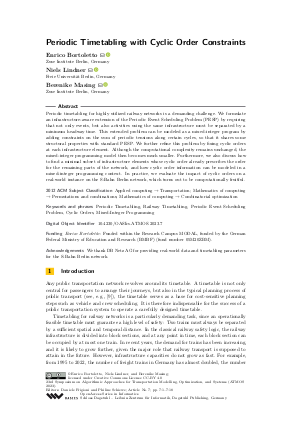@InProceedings{bortoletto_et_al:OASIcs.ATMOS.2023.7,
author = {Bortoletto, Enrico and Lindner, Niels and Masing, Berenike},
title = {{Periodic Timetabling with Cyclic Order Constraints}},
booktitle = {23rd Symposium on Algorithmic Approaches for Transportation Modelling, Optimization, and Systems (ATMOS 2023)},
pages = {7:1--7:18},
series = {Open Access Series in Informatics (OASIcs)},
ISBN = {978-3-95977-302-7},
ISSN = {2190-6807},
year = {2023},
volume = {115},
editor = {Frigioni, Daniele and Schiewe, Philine},
publisher = {Schloss Dagstuhl -- Leibniz-Zentrum f{\"u}r Informatik},
address = {Dagstuhl, Germany},
URL = {https://drops.dagstuhl.de/entities/document/10.4230/OASIcs.ATMOS.2023.7},
URN = {urn:nbn:de:0030-drops-187689},
doi = {10.4230/OASIcs.ATMOS.2023.7},
annote = {Keywords: Periodic Timetabling, Railway Timetabling, Periodic Event Scheduling Problem, Cyclic Orders, Mixed-Integer Programming}
}

 Creative Commons Attribution 4.0 International license
Creative Commons Attribution 4.0 International license






